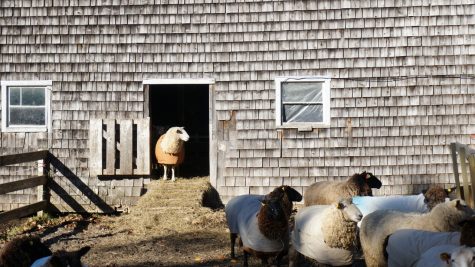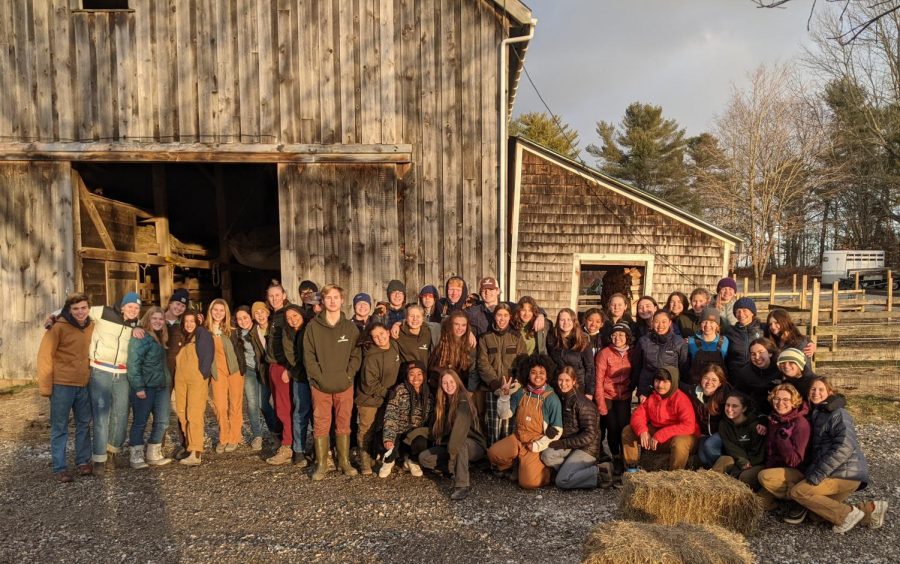Checking In With Lakeside’s Semester-Away Students
Lakeside offers a multitude of opportunities for Lakesiders to leave the comforts of campus: GSLs, Outdoor Trips, and, of course, study away programs. From the hustle and bustle of Washington DC, to a small town in France, to the largest city in South Africa, Lakeside’s study away programs “to experience a new and different environment, and engage in meaningful learning and living in a particular setting.” Of them, with the exception of the School Year Abroad programs, all are single-semester programs, and with the end of our second quarter of the 2021-2022 school year, students are due to return to Seattle. As such, with finals coming up and flights starting to be booked, Mira L. ‘23 and Kristen H. ‘23 are finishing their semesters on the eastern seaboard and preparing to return to campus.
Mira has been attending the Maine Coast Semester at Chewonki in coastal Maine. This program has 46 students living in cabins, taking classes that line up from their home school as well as additional classes relating to the environment and ecology of Maine. Especially for science classes, Mira says “it’s very hands-on, very much what’s going on in the world outside. We study it as it happens.” She also has work programs: working on a farm and maintaining it.
“Overall it’s been a really good experience,” Mira says, “I really love all my teachers and made a lot of good friends.” Other than the science curriculum, she also cites the farm experience as a highlight: milking cows, for one, but also how it is a “normal, accepted thing to just hang out with cows and sheep without a fence and go out and pet them.”

Mira chose Maine in particular because of its aforementioned science program, as well as its cabin-based living and the opportunity to see the east coast. She pursued a semester away in general program because, in her words, “I was excited to escape everything being restricted by COVID, because I’m essentially quarantined here — it sort of feels like COVID doesn’t exist,” a benefit to living in a secluded region of Maine’s coast with only staff and fellow students to share the air with.
As a final note, she mentions that Maine weather is “really nice compared to Seattle weather, it’s sunny all the time — colder, but sunny” which I view as a fair exchange.
Another east-coast program is the School for Ethics and Global Leadership in Washington DC, from which Kristen will be returning. Like the Maine Coast program, alongside each of their usual scholastic curricula, students take a class specific to their program. For SEGL that is the flagship Ethics and Leadership course, where classes range from visiting the Rwandan Embassy and learning about the aftermath of the Rwandan Genocide to presenting a policy document on Arctic Strategy to the U.S.’s Senior Arctic Official on the Arctic Council. SEGL also has Arabic and Mandarin classes as they were deemed “integral in a world where globalization is becoming increasingly rapid” according to Kristen.
Kristen was drawn largely because of SEGL’s focus on international relations, but was also intrigued by the “pre-college experience of being able to go and live somewhere else for a semester to experience a taste of the independence that [college will].” She was also attracted to its location in Washington DC, an opportunity to “hear a wider variety of perspectives,” she says, “since the city of Seattle is an extremely liberal echo chamber, and growing up in Seattle has definitely influenced a lot of my opinions.” This allure ultimately proved to pay off, as she cites that SEGL has entirely changed her worldview, “since my approach to virtually every ethical decision that I make has been shaped by all of the things that I’ve learned throughout the semester,” an experience further aided by the extremely high faculty to student ratio (2:1).
In addition to the ability to connect to faculty, the small class sizes and large number of faculty brings “meaningful discussions and discourse on some of the most interesting topics I’ve ever learned about, from Critical Race Theory to the ethicality of the United States’ grand strategy.” This also allows students to connect with other students on an individual basis, aided by the fact that all students live in dorms. The one major downside Kristen listed was the workload and schedule, with each day packed, but is evened out by the excellent classes and “weekends… spent taking fun field trips to nearby attractions, such as the Smithsonian, the Capitol, the White House, etc.”
In the end, both Mira and Kristen expressed how formative their experiences were — “I honestly could not imagine what my life would have looked like if I hadn’t attended SEGL,” says Kristen — despite looking forward to returning to Seattle and seeing friends, and familiar locales once more. When asked whether they would recommend their programs or not, both responded with a resounding “Yes!”
You can take the woman out of the bird, but you can't take the bird out of the woman: meet Yoon Lee.

